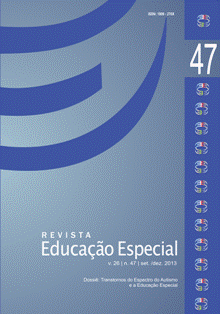Teacher training in alternative communition for children with TEA: contexts in action
DOI:
https://doi.org/10.5902/1984686X10475Keywords:
Autism, Autism spectrum disorder, Teacher education, Alternative communication.Abstract
This article presents an excerpt of the research project SCALA (Alternative Communication System for Literacy of Children with Autism). Herein, we focus on teacher education of professionals working with nonverbal Autism Spectrum Disorder (ASD) subjects so as to foster their sociocognitive development. From an overall view of the field of Alternative Communication, we discuss its insertion and usage for educational purposes with subjects with ASD. Specific teacher education aspects are addressed considering the current government policy on teacher education programs. Then, we propose a socio-historical and cultural approach to such process from action contexts aiming at the reorganization of the relations of subjects with ASD with the world, and not simply the expansion, complementation or supplementation of the communication functionalities of nonverbal subjects with ASD. Finally, from the presented panorama, we show some outcomes research from TEIAS (Technology in Education for Inclusion and Learning in Society) research group on the scope of SCALA project. We analyze two teacher education proposals developed from an integrative view of three interrelated movements: problematization as pedagogical action; thought into action, and critical analysis as reflexive action.Downloads
Downloads
Published
How to Cite
Issue
Section
License
Declaration of originality
We declare that all articles present in the journal Revista Educação Especial (UFSM) are originals and were not submitted for publishing on any other publication, as a whole or a fraction. We also declare that, after being published by Revista Educação Especial (UFSM), a paper will not be submitted to another journal within two years. After this time, our journal transfers the publishing rights to the authors, with a permit granted by the Editorial Council.
We also acknowledge that the originals’ submission to Revista Educação Especial (UFSM) implies on a transference of copyright for physical and digital publishing to the journal. In case of noncompliance, the violator will receive sanctions and penalties predicted by the Brazilian Copyright Protection Law (n. 9610, dated 19/02/98).







